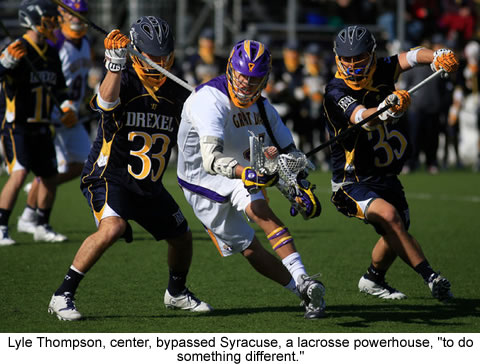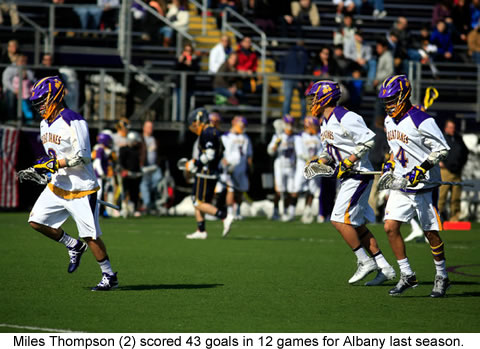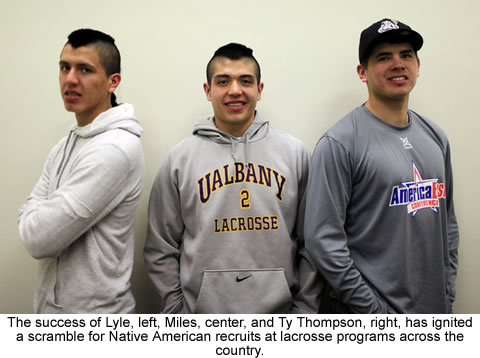 |
Canku Ota
|
 |
|
(Many Paths)
|
||
|
An Online Newsletter
Celebrating Native America
|
||
|
June 2014 - Volume 12
Number 6
|
||
|
|
||
|
In A Native American Sport, |
||
|
by Zach Schonbrun -The
New York Times
|
||
|
credits: photos by Nathaniel
Brooks- The New York Times
|
|
College Lacrosse Upended by Albany's Native American Stars
They were watching Lyle Thompson, an Onondaga Indian from upstate New York, who has become a Wayne Gretzky-like figure in collegiate lacrosse. Last year, his sophomore season, Thompson finished one point short of tying the N.C.A.A. single-season record with 113 points on 50 goals and 63 assists in 17 games while leading SUNY Albany into the postseason for the first time since 2007. He is a strong contender for this year's Tewaaraton Award, lacrosse's Heisman Trophy, which has never gone to a Native American. If he does not win, it could easily go to his older brother, Miles, who scored 43 goals in 12 games for Albany last season. And if Miles does not win, their cousin and teammate, Ty, has a chance. The Thompsons, who grew up on a reservation in upstate New York,
are more than exceptional athletes thriving in the sport of their
ancestors, a sport that is still endowed with deeply spiritual significance
to Native Americans. They are trailblazers who have upended the
athletic world and reservation life, and their success has ignited
a scramble for Native American recruits at lacrosse programs across
the country.
Syracuse, the regional powerhouse that has won 10 N.C.A.A. championships, has long seemed the only way off the reservation for young Native Americans aiming for Division I. Other universities rarely recruited on reservations because they knew the players would choose Syracuse. But the Thompsons have effectively cracked the door to the reservations. "The distance between Albany and Syracuse, at the time that they did it, can't be measured in geographical miles," said Bill Tierney, the lacrosse coach at the University of Denver. "It was a giant-leap-for-mankind sort of thing." Change has come quickly. Zed Williams of the Cattaraugus Reservation in New York enrolled this fall at the University of Virginia, and Zach Miller of the Allegany Indian Reservation in New York enrolled at the University of Denver. Frank Brown, an attackman who is also from the Allegany reservation, enrolled last year at Hobart and William Smith Colleges in Geneva, N.Y. Casey Vock, a writer for Inside Lacrosse magazine, pointed to the Thompsons as the catalysts, and said he believed more colleges would successfully recruit Native Americans. The Thompsons chose Albany because they said Syracuse was taking them for granted, and because they were eager to open a new door. "We wanted to do something different," said Miles Thompson,
23. "We knew all of the big-time natives were already going to Syracuse.
We wanted to try to make a difference on our own."
Their father, Jerome Thompson Sr., played indoor box lacrosse for the Iroquois Lacrosse Association. He trained his four sons with wooden sticks and a wooden box, about two-feet wide, with a round hole in the middle barely bigger than the ball itself. That was their net. "Everybody told me that my kids were going to be behind because I didn't let them play in organized leagues," Jerome Thompson Sr. said. "I just let them talk. As a parent, I felt that I could put more hours into them." Albany has no meaningful connection to Native American athletes, certainly not compared with Syracuse, which can trace its history with Indian athletes back to Oren Lyons in the 1950s and has had at least one Native American player on its roster for more than a decade. But Albany has embraced the Thompsons. Their coach, Scott Marr, said the playmaking among the three bordered on telepathy, and he often describes them as being "closer than twins." They have special calls for each other in Mohawk, and when Miles yells Lyle's Indian name — "Deyhaus!" — something special often happens. On March 1, Miles and Lyle Thompson combined for 12 goals, more than Harvard's entire team, in a 14-8 win. The three Thompsons live in a house off-campus, where their lives revolve around family, lacrosse and schoolwork. They take pride in abstaining from drinking, smoking or chewing
tobacco — the primary vices, they said, that weigh on their
communities back home. One recent afternoon, Lyle Thompson, 21, took out a rattle made
from the shell of a snapping turtle he had caught while golfing
with his oldest brother, Jeremy. He uses the rattle to make music,
part of the way he stays connected with Indian culture. Learning
the Onondaga language is another.
While most people might not appreciate the differences between Albany and Syracuse, for Native Americans, it would be hard to overstate the boldness of the Thompsons' choice. They grew up with Syracuse's orange T-shirts and sweatshirts and attended games at the Carrier Dome, where Indians like Brett Bucktooth, Cody Jamieson and Sid Smith starred. Their older brother, Jeremy, played two seasons for Syracuse. They almost certainly could have played there as well. But after Lyle Thompson's breakout state title game his sophomore year, in which he scored five goals, he became a highly prized recruit. And the Thompsons made it no secret: Wherever Miles went, Lyle would go, too. "Schools were looking at me because they wanted him," Miles Thompson said. As they were being recruited, though, the brothers began to feel like Syracuse was taking their allegiance for granted. "Syracuse honestly didn't recruit both of us too hard," Lyle Thompson said. "I think they just expected us to go there." Through a spokesman, Syracuse Coach John Desko declined to comment. Ty Thompson, 23, committed to Albany in the summer of 2009. His cousins soon followed. "They've led by example to a point where you see the younger kids talking about where they want to go," said Vock, of Inside Lacrosse magazine. Last season, Albany defeated Syracuse for the first time. Miles Thompson scored the winning goal in double overtime. For this season's rematch on Feb. 16, Jerome Thompson Sr. estimated that 400 people from the Onondaga and neighboring reservations were among the 6,484 at the Carrier Dome. Albany did not win this time, but stood toe to toe with the top-ranked Orange in a 17-16 overtime loss. Ty Thompson scored five goals, and Lyle Thompson had five assists. "Because of the way they play, being all native and being on the same team, it's something special for us as native people," Thompson Sr. said. "To come and build this program for other kids, to just come and step right on the field, it's hard to do that." |
|
|
||
|
|
||
| Canku Ota is a free Newsletter celebrating Native America, its traditions and accomplishments . We do not provide subscriber or visitor names to anyone. Some articles presented in Canku Ota may contain copyright material. We have received appropriate permissions for republishing any articles. Material appearing here is distributed without profit or monetary gain to those who have expressed an interest. This is in accordance with Title 17 U.S.C. Section 107. | ||
|
Canku Ota is a copyright ©
2000 - 2014 of Vicki Williams Barry and Paul Barry.
|
||
 |
 |
|
|
The "Canku
Ota - A Newsletter Celebrating Native America" web site and
its design is the
|
||
|
Copyright ©
1999 - 2014 of Paul C. Barry.
|
||
|
All Rights Reserved.
|
||
 ALBANY
— The Albany lacrosse coaches stared at a small projector screen,
searching for the black streak of a three-foot-long ponytail swooping
toward the goal.
ALBANY
— The Albany lacrosse coaches stared at a small projector screen,
searching for the black streak of a three-foot-long ponytail swooping
toward the goal. The
Thompsons made a decision that seems unexceptional to outsiders
— they chose to attend Albany, which is part of the state university
system, instead of Syracuse. But to Native Americans, that decision
was fraught with meaning.
The
Thompsons made a decision that seems unexceptional to outsiders
— they chose to attend Albany, which is part of the state university
system, instead of Syracuse. But to Native Americans, that decision
was fraught with meaning. So
far this season, which began last month, they have accounted for
65 of the team's 110 points through four games. They have 41 of
68 goals, and only one other player has more than five. All three
Thompsons grew up on the St. Regis Mohawk Reservation in upstate
New York. When Lyle and Miles Thompson were about 7, the family
moved south to the Onondaga Reservation, 11 miles from Syracuse.
So
far this season, which began last month, they have accounted for
65 of the team's 110 points through four games. They have 41 of
68 goals, and only one other player has more than five. All three
Thompsons grew up on the St. Regis Mohawk Reservation in upstate
New York. When Lyle and Miles Thompson were about 7, the family
moved south to the Onondaga Reservation, 11 miles from Syracuse. "That's
one of the most important things to me is our language," Lyle Thompson
said. "And our songs."
"That's
one of the most important things to me is our language," Lyle Thompson
said. "And our songs."